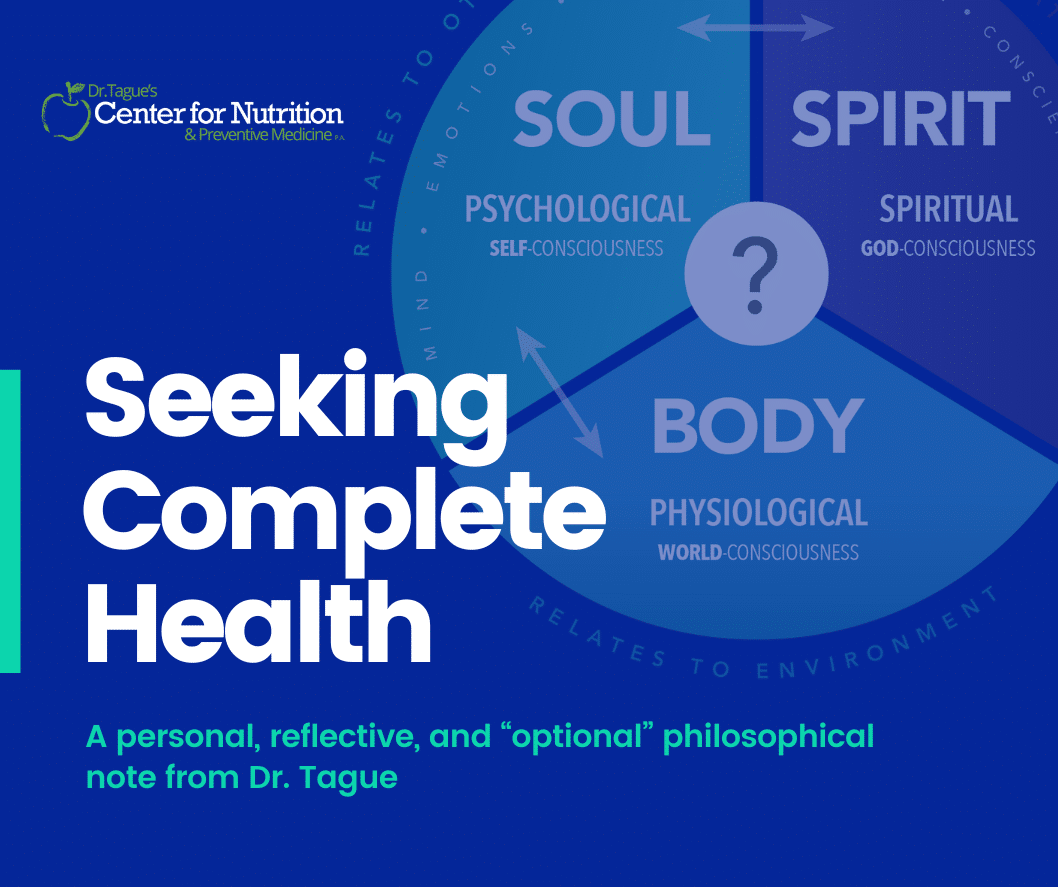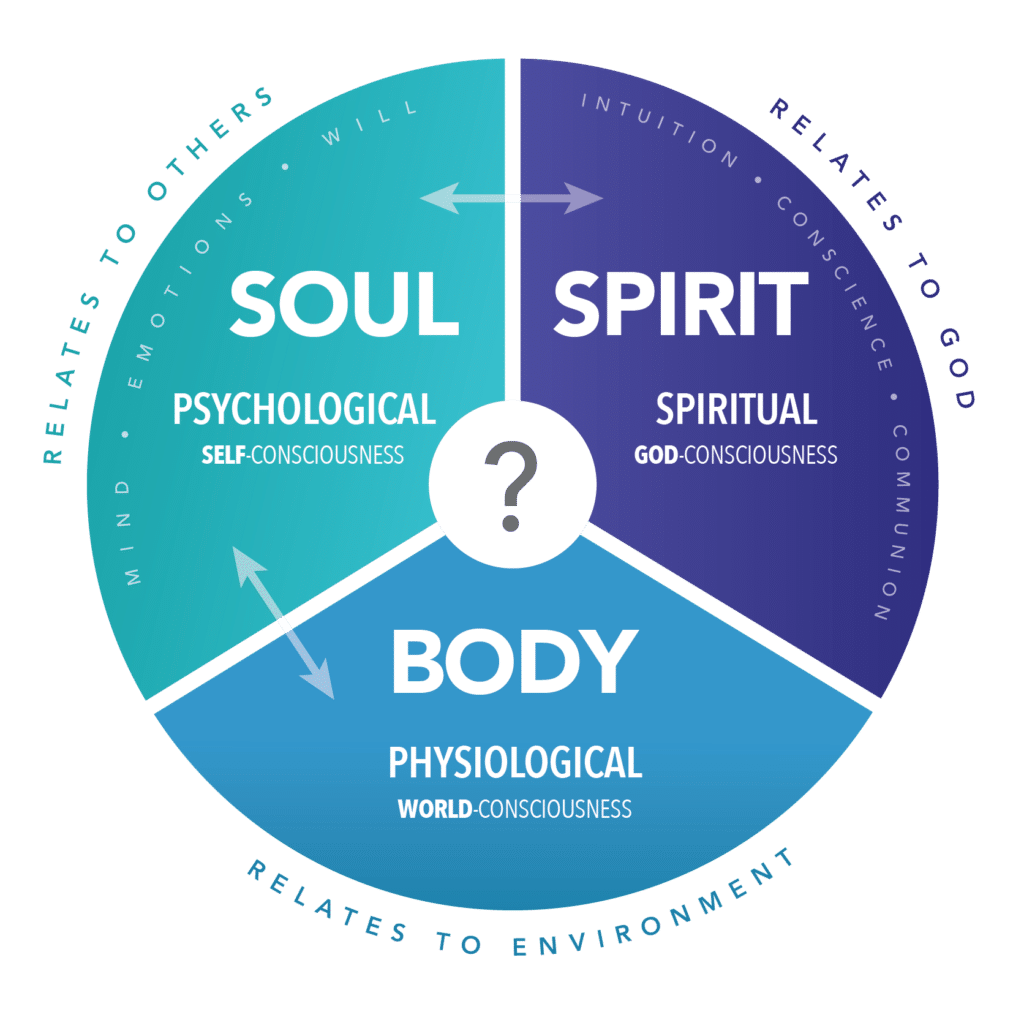A personal, reflective, and “optional” philosophical note from Dr. Tague
Humans are complex beings. And that is an understatement! What is it that makes us who we are? Are we just a bag of skin containing chemicals and chemical reactions? Or, is there an immaterial, “can’t touch it” aspect to man that makes us unique as individuals? And could the immaterial part of man influence our health and sense of well-being?
Although most of my articles are based on scientific research studies, this article is intentionally different. It discusses the aspects of humans that cannot be measured, but are essential for health. You see, as a physician with a reflective and analytical nature, I am convinced that there is a very important non-physical aspect to each of us that makes us who we are. Further, this must be acknowledged and discussed if we are to seek after “whole person” optimum health.
Let me introduce an overview of the “tripartite” or “three-part” view of man (body, soul, and spirit). I like this three-part view since it makes it easy to identify and discuss the different aspects of who and what we are. Here are some quick definitions and a diagram that puts it in a visual format.
Body: Our physical being. The part of us we can touch. The body is alive only if the soul and spirit are present in the body. Conversely, the body dies when the soul and spirit depart from the body.
Soul: Soul is the best English word for the Greek word psyche. This is the root word for psychological and refers to our personhood or personality, which is separate from our physical bodies, but very much alive and ever changing. The emotional aspect of our being and the distinct personality traits that make us unique are rooted in our soul. The soul can be thought of as our mind, will, and emotions.
Spirit: Our spirit can be thought of as the immaterial part of us that includes our conscience, our “intuition”, and the part of us that can seek spirituality through prayer or meditation. In this model, spiritual pursuits, prayer, and having moral values would occur in our spirit. A sense of inner joy or peace happen in our spirit. At other times our conscience, a spiritual concept, might tell us we need to forgive someone or make some life changes.
What is Optimum Health?
One dictionary definition is “a state of well-being”. Likely, since you are reading this, it is now a season in your life for evaluating your current physical health and seeking after life improvement. That might be weight loss, more energy, lower blood pressure or cholesterol, less joint pain, or improved physical attributes to enhance your quality of life.
Improved physical health will generally not occur or be maintained unless it is accompanied by good psychological and emotional health (the soul). For example, how many of us are “stress” eaters? How often does emotional exhaustion weaken our resistance to “comfort food”? How about unhealthy relationships or criticism from others? Stress, especially “people stress” is a common trigger for us to “get off” our diets, feel depressed, be anxious and experience other health problems. Psychological influences significantly influence our physical state.
And doesn’t spiritual health, including joy, self-control, and peace give us an inner strength to resist temptations, like wrong foods, that on other days might sabotage our efforts. Peace, joy, self-control, patience, and a “clear conscience” toward others are all signs of spiritual health that can empower us toward improved physical health. Indeed, research studies show that those with healthy, active spiritual lives have less physical disease and better mental health. And better mental health leads to improved physical health. Stress, for example, is a thief of good health!
What’s the Significance?
True, “whole-person” health is not common (unfortunately), is not easy to come by, and cannot be taken for granted. However, it can be pursued in a wise manner with improving one’s chance of success in achieving good health. So, what are wise approaches for consideration?
1. Pursue physical health with wisdom and understanding. Read, ask questions, and surround yourself with wise counselors. Follow effective strategies that are founded in truth (not fads), sensible, achievable for you, and that address your particular challenges and conditions.
2. Pursue psychological well-being while pursuing physical health. If you’ve offended someone, ask forgiveness and pursue kindness in the relationship. If there have been critical words directed toward you, don’t dwell on them, forgive and forget, move on. If relationships cannot be mended, seek new, healthy relationships. Practice kindness and mercy. Acts of giving always provide blessing to the giver. For many of us, physical activity is a key to psychological health.
3. Pursue spiritual health. For some, this may mean slowing down enough to spend time in prayer, reflection, or meditation. Others may join fellow “seekers” who pursue God. It may mean having a more meaningful relationship with God. Some may seek reconciliation if previous words or actions have resulted in a sense of remorse. If your conscience tells you personal changes should occur, pay attention. Seek restoration of pertinent relationships, ask forgiveness where needed, and commit yourself to living a life of kindness. And, for me, reading from Psalms or Proverbs is a daily spiritual encouragement that provides direction for me as I start my day.
Summing it up:
Once considered, the interactions between body, soul and spirit are apparent. To achieve great physical health, also pursue health in soul and spirit. Seek optimum health in all areas of life. Your efforts, pursued with passion, sincerity, and wisdom, will be honored and rewarded. May your life be richly blessed as you pursue health and what is true, right and good in your life.
For Optimum Health,
Rick Tague, M.D., M.P.H. & T.M.
Specialist in Nutrition & Obesity Medicine



